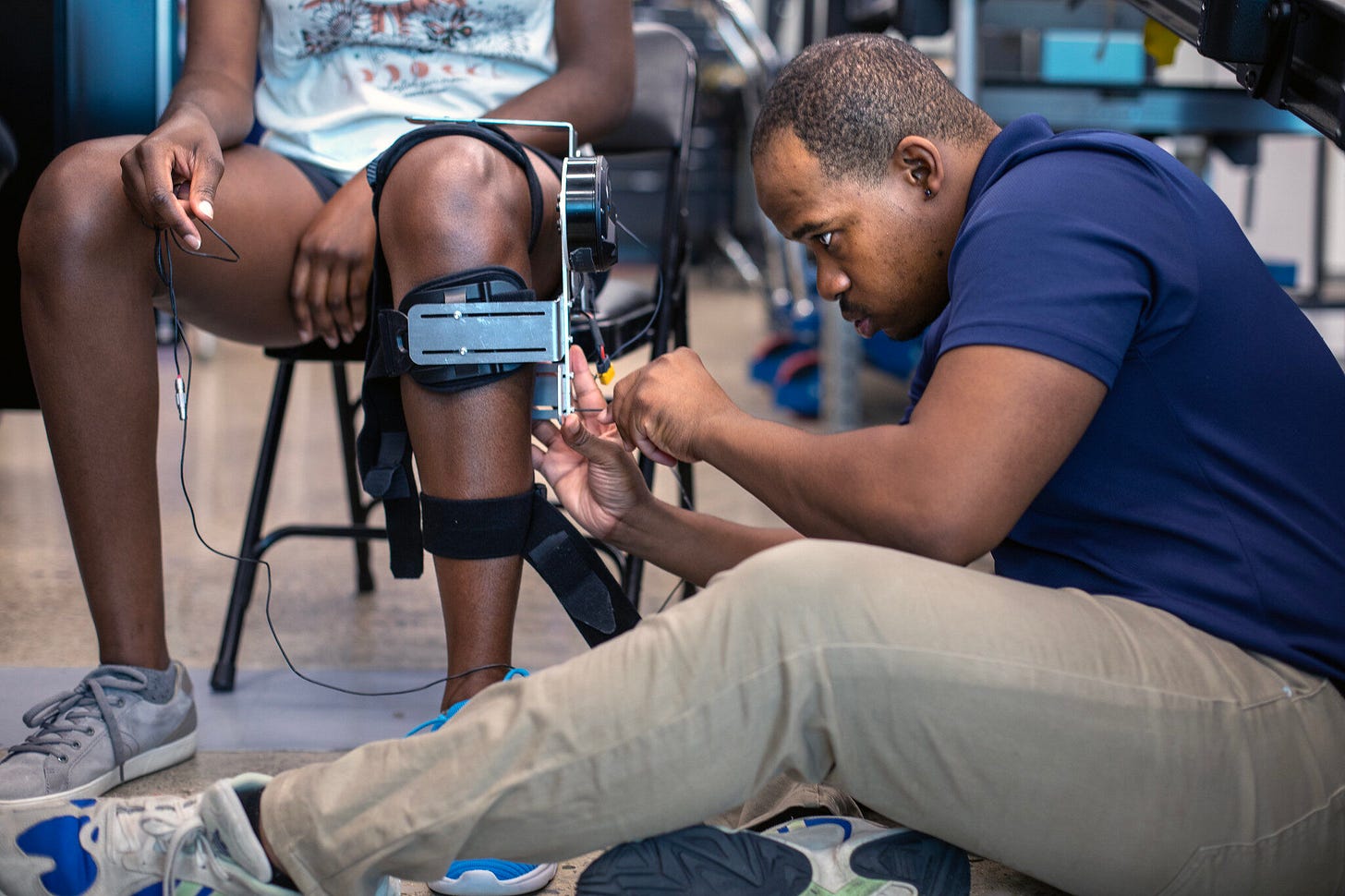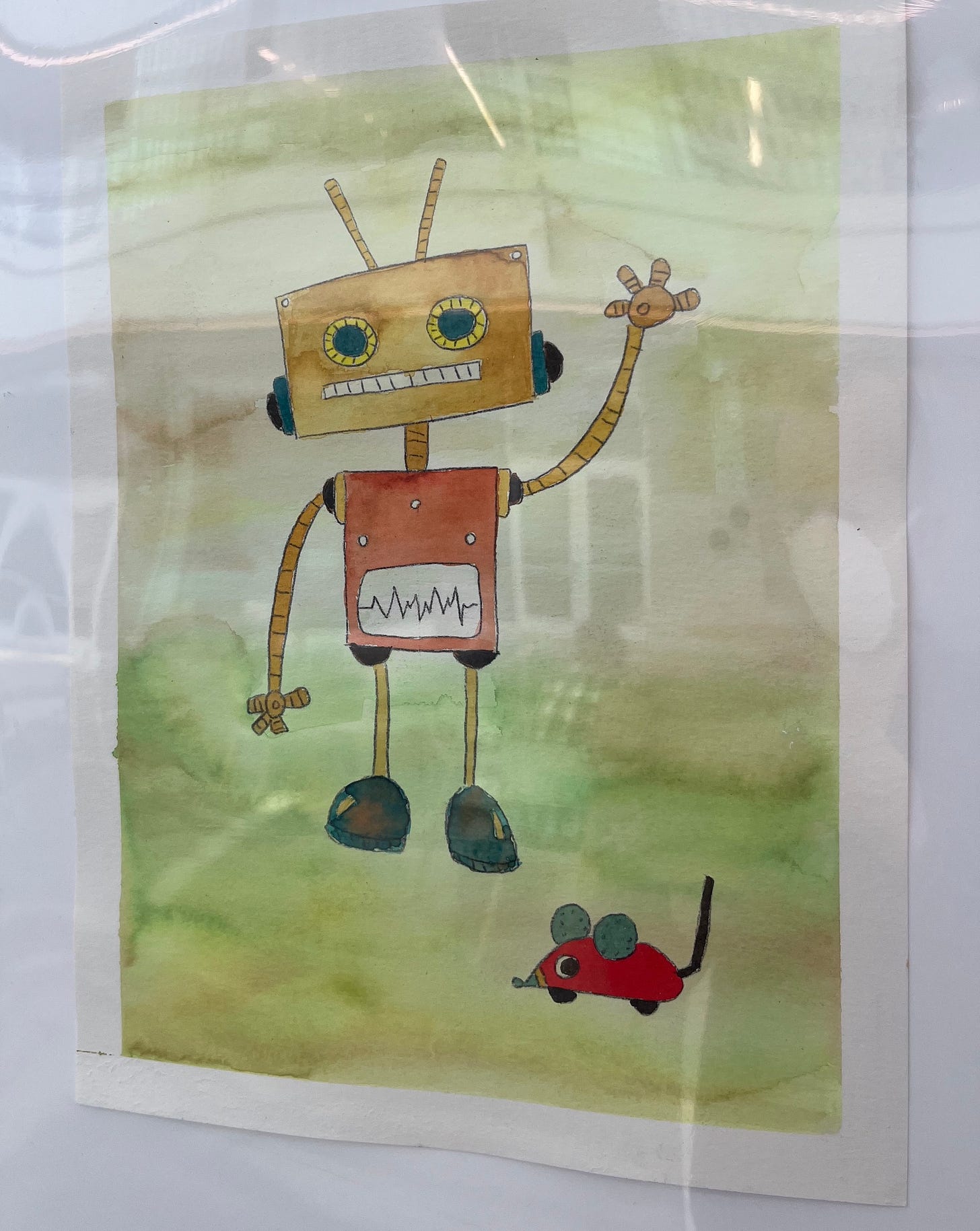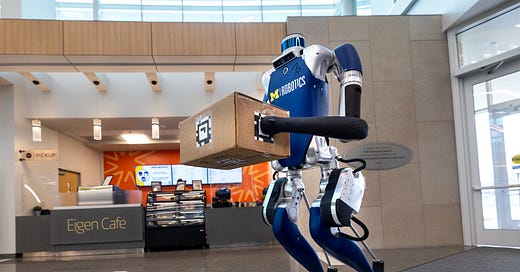Robot art shows, the drinking philosophers problem, and putting a price on exos
Plus ROB 311 is added as a new open-access course available on GitHub
Welcome to the Michigan Robotics newsletter, a summary of what’s happening in the University of Michigan Robotics community.
Did you know that we have published several of our courses online, including lecture videos, textbooks, coursework, and exams, to be freely available through YouTube and Github? We’ve just added ROB 311: How to Build Robots & Make Them Move to the list below. Find out about all the courses here.
ROB 101: Computational Linear Algebra
ROB 102: Intro to AI & Programming
ROB 320: Robot Operating Systems
ROB 501: Mathematics for Robotics
ROB 502: Programming for Robotics
ROB 530: Mobile Robotics
Research
$3.1M to transform post-stroke mobility treatment

A new tool to measure essential properties of the ankle joint—and an exploration of whether botulinum toxin injections are helpful—could help survivors walk better in this new study conducted by Elliott Rouse, Chandramouli Krishnan, Edward Claflin, James Richardson, and Corey Powell.
A slew of U-M papers at Robotics: Science and Systems
Nine papers with authors representing the University of Michigan were presented at this year’s RSS Conference in Korea. This included a Best Paper nominations with authors Sangli Teng, Ashkan Jasour, Ram Vasudevan, and Maani Ghaffari, and a Best Student Paper from Andrea Sipos, and Nima Fazeli.
The Theory of Mind and Human-Robot Trust Repair
Connor Esterwood and Lionel Robert find individual differences in mind perception are vital considerations when seeking to implement effective apologies and denials between humans and robots.
Human Security Robot Interaction and Anthropomorphism
Xin Ye and Lionel Robert conduct a study rating security robots on anthropomorphism, ability, integrity, and desire to use.
From drinking philosophers to asynchronous path-following robots
Yunus Emre Sahin and Necmiye Ozay consider the multi-robot path execution problem where a group of robots move on predefined paths from their initial to target positions while avoiding collisions and deadlocks in the face of asynchrony.
Putting a price on exoskeleton assistance
Elliott Rouse writes about a Nature paper with Leo Medrano, Gray Thomas, and Drew Margolin where the team borrowed a tool from economics to measure the costs and benefits of wearing an exoskeleton, and found that it offers a modest average benefit of US$3.40 per hour while walking uphill, when considering the combined effects of the assistance and device weight. This modest value is in contrast to the value of the assistance alone, which was much greater, at $19.80 per hour.
Watch
Peter Mitrano and the ARM Lab use their Spot robot to explore reasoning about how to recover from problems when dragging a hose.
CBS News Detroit reports on our students and labs as a part of UM’s Women in Science and Engineering summer grade school programs that show students the robotics, science and engineering that happens at a high level.
Paul Flanigen presents a PhD defense that looks at how best to automatically detect, catalog, and categorize hazardous obstacles for pilots.
Read
ChatGPT Interviews Matias del Campo: Architecture, Hallucinations, and other Exotic Occurrences
Switching roles with the popular chatbot, del Campo shares insights on his background in artificial intelligence and thoughts on its future application to the design process.
Listen
Mechanically Incorrect: Legged Robotics Podcast
Jesse Grizzle and Christian Hubicki discuss advances and applications of legged robots.
Congrats
Outstanding Graduate Student Instructor
Liz Olson was awarded Outstanding Graduate Student Instructor from Computer and Engineering as the lead GSI of EECS 467: Autonomous Robotics.
SEAGULL wins $500k Alexa Prize SimBot Challenge
The University of Michigan team, made up of Yichi Zhang, Jianing Yang, Keunwoo Yu, Yinpei Dai, Shane Storks, Yuwei Bao, Jiayi Pan, Nikhil Devraj, Ziqiao Ma, and Joyce Chai, won the Amazon Alexa Prize SimBot Challenge. The SimBot Challenge's goal is to advance the development of next-generation virtual assistants that help humans complete real-world tasks by continuously learning.
Katelyn King has been named a 2023 Astronaut Scholar! She is a rising senior majoring in Biomedical Engineering and Robotics, and working in Medtronic’s Research & Development division.
Robotics Department Faculty Award
Elliott Rouse earned the Robotics Department Faculty Award as a key player in building curriculum and culture while maintaining a robust research lab.
Parting shot




